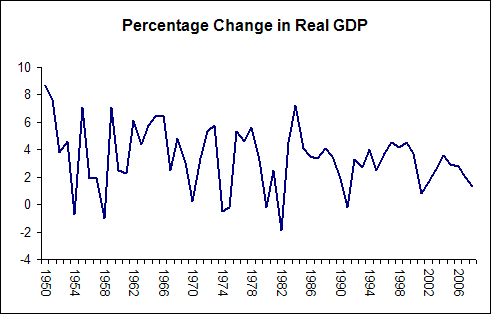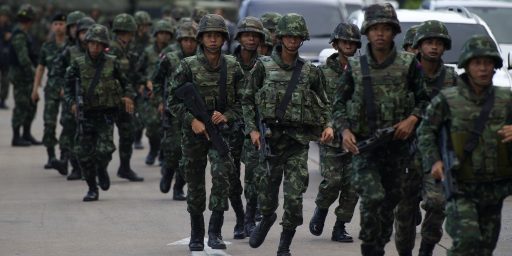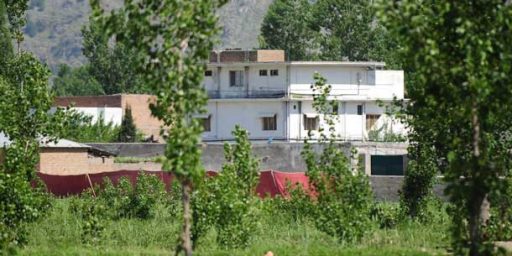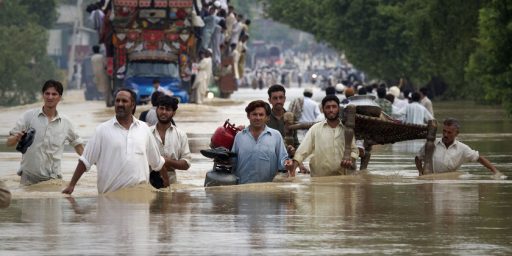What Makes Iraq’s Islamists Special?
Bernard Finel, weighing in on the “Two Iraq Wars” debate, makes an interesting point:
The fact is that there are many Islamist insurgencies around the world — Morocco, Algeria, Tunisia, Somalia, Yemen, Afghanistan, Palestine, Lebanon, Pakistan, Thailand, Philippines, etc. All of them are potential locations for AQ to establish a safe haven… indeed, they have already established one in Pakistan. There is nothing unique about the threat posed by internal violence and Islamist groups in Iraq… except that fact that we are already there. So they are not separate wars, but rather a single conflict characterized by poor planning, incoherent strategy, and mission creep.
If we have to win in Iraq, then why are we under no similar compulsion to intervene in all those other conflicts? If you can answer that question in a coherent manner, then you get to make the case that meddling in Iraq’s internal affairs is crucial to American national security. But frankly, I have never heard a convincing case for why Iraq’s insurgents are that much more dangerous than the others.
It’s a fair point.
After all, were we not in Iraq, and it, for the sake of argument, otherwise looked exactly as it does now, we almost certainly wouldn’t decide to send troops into that mess, right?
Then again, the fact that we are in Iraq — and that our invasion created the stage for the explosion of Islamist violence there — is a significant “except for.” Further, one presumes the Islamists in Iraq are a greater threat to us and our interests than those in, say, Thailand.






I’m not sure ‘mission creep’ is a fair asesment, given the changing nature of the enemy and the war being brought to us BY that changing enemy. Are we to not react to it?
As for…
It’s clear Finel has forgotten, if he ever really understood, why a woking democracy in Iraq was set as a goal in the first place, and why radical Islam is so dead set against it; to wrest control not only of Iraq from the radical islamists, but once so established, such a democracy’s very existance serves as a caling and stabilizing influence against radical Islam, for the remainder of the region. It was that lack of a stable influence in the region which allowed the terrorists to train and build up their movement. Think that, lack, and that buildup affected our national security, and that of the world?
This is a pretty pollyanna-ish assessment. It is much more sensible to expect that increasing democratization could provide even more power to radical Islam–just look at Hamas. If Egypt had popular elections the Muslim Brotherhood would likely prevail.
While not Islamic, a US-designated terrorist group just won popularly contested elections in Nepal.
And the other path… what lies in that direction? The Shah? Saddam? And isn’t that interesting? Wasn’t all that long ago the left was complaining that we supported Saddam, and the Shah, which led to our current problems in the region. You’ve just given us a fair answer as to WHY we did so. Your argument prevailed at that time. Then again, we now see how well, that situation worked.
So, what that leaves us with is the course we’re now on, as the only alternative to another Saddam.
All insurgencies are not created equal. All the locations mentioned above are either relatively miniscule in scope, and therefore not a viable threat to our security, such as Morocco, or are being combatted by the government in power, such as in the Phillipines or Pakistan.
Iraq however posed a different problem in that Saddam Hussein used the threat of AQ, and to some degree promoted it, for his own political ends, rather than combat it. This posed a serious threat to the entire region, and by extension to our security.
To equate the insurgency in Iraq with that in say Yemen is laughable.
Only because we haven’t given them a hundred thousand targets in Thailand.
Does anybody think that either AQI or the Shia militias are capable of attacking US interests outside of Iraq? Does anybody think the Shia militias would even be interested in doing so?
So, Maliki is not another Saddam?
Then again, the fact that we are in Iraq — and that our invasion created the stage for the explosion of Islamist violence there — is a significant “except for.†Further, one presumes the Islamists in Iraq are a greater threat to us and our interests than those in, say, Thailand.
Um, I’m a bit confused here. The assessment of even our own military has consistently been that foreigners have always been a miniscule part of the insurgency in Iraq. Further, the insurgency is almost entirely nationalistic, not “Islamic”. The whole “awakening” that has been widely touted has pretty much shown that there isn’t any real affinity between what we’re calling an “Islamic” movement and the Sunni insurgency. Going even further, we note that Sunnis aren’t exactly naturally aligned with what is a Shiite movement.
By all assessments, we’re not fighting Islamist violence in Iraq except in the trivial sense that the Sunni insurgents are muslims.
So, again, why are we still in Iraq?
Does this Bernard Finel even follow world happenings at all to make stupid-assed comments like this?
Sub-Sahara Africa is a mess and very hard to instill order their at all. Look at the US’s attempt at installing order under Clinton. Yeah that was real popular with the Somoli Clans.
Algeria’s own government has whipped the terrorists pretty much and it’s a small remenant (if at all) of what it once was.
Tunisia/Morroco have a government which is anti-terrorist, and those movements their have pretty much died out (compared to when it was most potent)
Palestine isn’t a country their buddy. WHich map is he going from? The Isrealis are protecting themselves pretty well, considering Eygpt doesn’t do squat with Gaza to crush terrorists.
Lebannon, the US is trying to get a anti-terrorist (ie non-Syrian) government stabilized and working for the good of the country. But Hamas is actively supported/payrolled by Iran to forment hatred against Isreal and destablize the central government.
Phillipines, while they have an insurgency their the Phillipine Armed Forces are going after them, with US Special Ops training (I believe), probably some help with Navy/AF survelience too.
Pakistan, the US if trying to goad them into being harder against their uncontrolled badlands, but they just had a democratic election. So the US can’t throw it’s weight around their.
Really, I just follow the world-happenings, and I know this much. Is he really supposed to be someone that’s knowledgable in this stuff?
I wasn’t aware Maliki had dictatorial powers, nor was I aware he’d set himself up as a god-like figure.
Ummmm… no. Because, rather, we have no information suggesting they’ve set up training camps there, nor have the lauched any attacks elswhere in the world, from there. be easy enough to do in the jet age, they’ve simply not DONE it.
well, yes, and no.
That was the situation, back in June of 05.
From the Wiki, today:
At the bottom line, your suggestion that the insurgency is in fact home grown, I suppose to depend on how long one needs to be in country to match your description of ‘iraqi’.
You mean Hezbollah, don’t you?
The cult of personality isn’t there, I’ll give you that much. But the comments I hear coming from actual Iraqi’s is that Maliki’s Badr corps does pretty much whatever it wants, without legal repercussions.
Which was also true of AQI (or what was to become AQI) in 2002.
Actually, “According to the US State Department, the group is funded by Iran, Palestinian expatriates, and private benefactors in Saudi Arabia and other Arab states.”
But, yeah, I’m guessing he meant Hezbollah.
Forgive my sceptacism, but it seems _every_ bad thing in the world is somehow being run out of Iran these days, at least according to our current administration officials.
Tracking down the Wikipedia link, it points to a 2005 PDF that contains just the outline of a report. The outline itself only lists Hamas as a terrorist group, it doesn’t say anything about who is funding them.
There is that. It certainly wouldn’t surprise me if Iran were funding Hamas, though, under the principle “The enemy of my enemy is my friend.”
Besides, James, Hamas is the one in power, just now.
At the bottom line, your suggestion that the insurgency is in fact home grown, I suppose to depend on how long one needs to be in country to match your description of ‘iraqi’.
Um, no. No one is disputing there aren’t some foreign fighters. But no one in the military disputes the fact that this is a nationalist insurgency and not a foreign invasion. The wiki you point to doesn’t say how much of the insurgency is composed of foreign fighters and so your holding the flashlight under your chin and muttering darkly about definitions doesn’t mean squat…
The bottom line is that we have been fighting against a sunni dominated nationalistic insurgency. With the “awakening” movement, many of these Sunnis turned against what little Al Qaeda “islamists” there were and they seem to have done a good job getting rid of them. Now we have a intra Shiite power struggle going on.
Again, nothing even close to your dark mutterings of a global conflict. We were refereeing a horrific civil war and now it looks as though we’re going to referee another one.
Madness.
That’s why the 2 war thesis is so stupid. The so-called 2nd war is a continuation of the so-called 1st. I guess Austria’s invasion of Serbia in 1914 was a separate war from the US’s defense of the Marne in 1918. Of course not. 1918 was nothing more than the progression of events from 4 years earlier, some of which may have been foreseen, some of which could not have been.
The whole 2 war thesis shows that conservatives can be just as stupid as liberals when they over-analyze a problem.
As for the question at hand, the obvious answer is the size of the islamist push in each country. Plus there is an active US military effort, covert or otherwise in most of those other countries listed.
ScottT… with all due respect… you don’t know what you are talking about. Iraq has an anti-terror government as well by your logic. The question is whether the jihadist movement in Iraq is any more dangerous than that anywhere else.
Morocco-based groups have been linked to attacks in Germany and Spain. Algerians to plots all over the place–from the U.S. to the Indonesia. Tunisian groups into Italy. And on and on and on. At this point, the most we have seen from Iraqi groups is a plot in Jordan, as far as I know. By any reasonable measure, the violent Islamist groups present in at least a dozen countries pose at least as large a threat to the United States and its allies as the groups active in Iraq.
Facts are sometimes unpleasant to consider… but that does not make them untrue.
This argument is built on a fundamental fallacy.
If we have to win in Iraq, then why are we under no similar compulsion to intervene in all those other conflicts?
First, that we aren’t intervening in other places around the world. We are.
Second, that to intervene we must be using the same means as Iraq. This is a very ironic position for someone who is advocating running away in Iraq. In short, lets create a dozen Iraqs to be consistent. It is like saying to use a hammer in one part of building a house, you must either stop building the house or use the hammer as the only tool for all aspects of building the house.
Third, as James notes, were are there now. To retreat will not be seen as an enlightened step of America rejecting going to Iraq in the first place (or second place depending on how you count the earlier 1990’s episode). There is a reason why AQ was recruiting and sending people from many of the countries listed. The fact that those recruits are finding life in Iraq less pleasant as the Anabar awakening spreads is good news for Iraq and the rest of those countries. Osama based his strategy on showing America as being weak. To cave now would be to validate Obama’s strategy with the caveat that it took longer than expected to break the US. That would make the situation worse in those countries he lists.
Perhaps the question you ought to be asking is what gains are possible there, vs anywhere else.
Nationalist? Or simply Sectarian?
Bithead– it has been clearly established that there were no terrorists training camps in Iraq before the US invasion.
Why do you keep repeating this canard?
You are entitled to your own opinion, but not your own facts.
Why is no one else objecting to this dishonesty?
Is it just that everyone ignores bithead?
Nationalist? Or simply Sectarian?
It was clearly nationalist previously. Then some 2 million plus Iraqis were displaced internally plus another million plus left the country. Then there was all the ethnic cleansing. To be clear the largest humanitarian crisis *ever* happened on our watch.
Now with this largely settled, it seems that we’re moving into sectarian civil war between Shiite factions.
This isn’t a war against foreign fighters. This is a civil war.
Again, why are we in Iraq?
That is the hope. But now the question becomes, How long do we have to stay there to insure the firm establishment of this “calming and stabilizing” influence? 50, 70, 100 years?
Uh, AQ is not now and never has been a major player in Iraq.
Yes, we are fighting Islamists there – just as in the past we have fought pirates elsewhere. But not everywhere, and not simultaneously (even WWII had non-combatant “bad guys”).
Congress did not even authorise the more recent invasion because of AQ or Islamists:
——-
The reasons:
Teqjack,
Do you bother to read what you post?
Are you people for real? Iraq is one battle in a larger war. We didn’t attack Iraq due to the “badness” of the terrorists there, we did so because it was to our strategic advantage. It was the easiest sell, if only for the multiple breeches of the cease-fire. We had to fight in the region, why not in the place we knew best, had fought a war in the last decade or so and had run combat missions in the no-fly zones since? If you’re going to fight someone away from home, it’s to your advantage to pick a battlefield you are most familiar with. Also, there’s the oil. We didn’t pick Iraq to get OUR hands on their oil, despite moonbat ravings, but because they could get revenue by opening up the oil fields they had a good chance to help themselves after things settled down. Obviously we were hoping they would settle down much faster, but we screwed ourselves on that one by turning our backs on them in 91.
Iraq was the best location to fight a war we did not start. If we had taken our heads out of our asses a decade or so earlier, it would have been much easier to prosecute this war.
What Makes Iraq’s Islamists Special?
There is a lot more oil in Iraq that many of those other countries, and if they got control of the country it would support their efforts, and the country is a lot more accessable to travel to other countries than for exampled land-locked Afghanistan.
Really?
Better recheck your facts.
I would suggest you look closely at the tensions that existed prior to the Iran/Iraq war.
How long have we been in Germany, Japan, and Korea for exactly that purpose? Kosovo? Getting the picture yet?